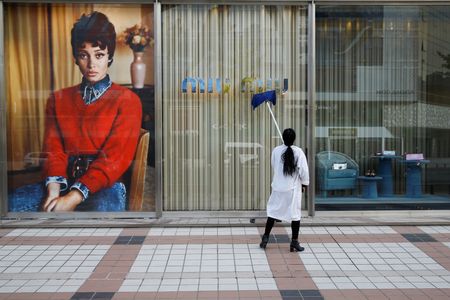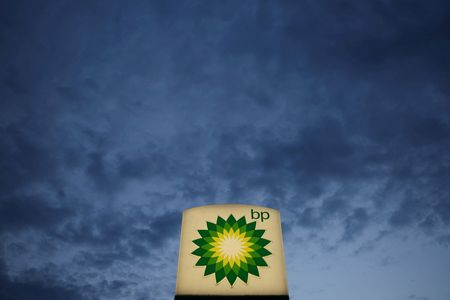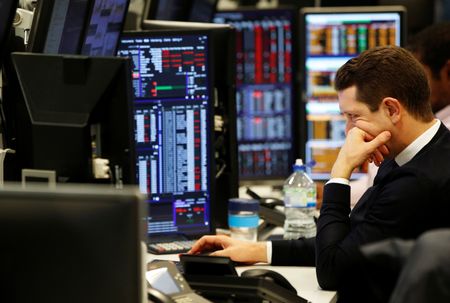By Yadarisa Shabong and Richa Naidu
(Reuters) – Ben & Jerry’s maker Unilever said on Thursday it would spin out its ice cream business and picked Amsterdam for its primary listing, with London and New York as secondary listings, in a potential blow to British finance minister Rachel Reeves.
Unilever announced the details of the listing structure alongside annual results and a 1.5-billion-euro ($1.6 billion) share buyback. Its shares dropped nearly 7% in early trading in London, wiping off about 8.5 billion pounds of its market value.
CEO Hein Schumacher had laid out cost cuts at the company last year, including separating the ice cream division through a demerger and cutting thousands of jobs to address years of underperformance.
The ice cream business – which includes the Magnum and Wall’s brands – generated turnover of 8.3 billion euros ($8.6 billion) in 2024.
Unilever said it would list the business on all three stock exchanges. It told Reuters that Amsterdam, where its business is headquartered, would be its primary listing.
That decision will likely be a blow to Britain’s Reeves, who met executives from Unilever in September last year, with the official register of meetings describing it as a discussion on investment in the United Kingdom and capital markets and reforms.
Reeves’ office did not immediately respond to a request for comment.
It was positive for the Netherlands, however, with Dirk Beljaarts, the Dutch minister of economic affairs, saying the decision confirmed Unilever’s “confidence in the Netherlands and underscores the competitiveness and attractiveness of our business climate”.
It would have been difficult for Reeves to woo Unilever given it had made commitments to the Dutch government back in 2020 that it would choose the Netherlands if it ever planned to spin-off its food and refreshment business. Unilever had at the time picked London as its main stock listing and tax venue when it simplified its dual legal structure.
UK officials implemented a suite of listing reforms last year aimed at helping London compete with New York and the European Union following Brexit, but the changes have yet to yield a noticeable turnaround in initial public offerings amid a long spell of outflows from UK funds.
Equipment rental firm and FTSE 100 member Ashtead Group, for instance, announced plans in December to shift its listing to New York, where many companies believe they can get a higher valuation.
CONTENTIOUS RELATIONS WITH BEN & JERRY’S
The listing might be complicated by Unilever’s increasingly contentious relationship with the independent board of Ben & Jerry’s, which ratcheted up its censorship lawsuit against Unilever last month.
It accused its parent company of suppressing a social policy statement the U.S. ice cream maker wanted to release because it mentioned President Donald Trump.
The brand and Unilever have been publicly at odds since 2021 when Ben & Jerry’s decided to stop selling Cherry Garcia, Chubby Hubby and other ice cream flavours in the Israeli-occupied West Bank because it was inconsistent with the company’s values.
Unilever’s shares, whose primary listing is in London, trade on the three stock exchanges where it plans to list its ice cream business.
“This decision follows a full review by the Board of separation options,” Unilever said in a statement.
A demerger of the business had been the most likely option, Barclays analysts have said, as such assets in consumer staples often perform well because they are pure plays.
Consumer health firm Haleon, spun out from drugmaker GSK in 2022, has seen its market value grow by about 5 billion pounds to 35.4 billion pounds since its listing.
Some analysts had preferred a clean sale or joint venture of Unilever’s ice cream division, or a joint US/UK listing as it reduced the risk of flow-back – when investors sell shares in a foreign company back to investors who live in the country.
Unilever reported fourth-quarter underlying sales growth of 4% on Thursday, compared with a 4.1% forecast by analysts in a company-compiled poll.
Tineke Frikkee, a portfolio manager at Waverton Investment Management, a Unilever investor, said Thursday’s decline in shares was down to a lack of positive momentum for the first half of 2025 and a risk quarterly forecasts will not be met.
Jean-Francois van Boxmeer has been appointed chair designate for the separated ice cream business, it said on Thursday.
The British company expects a slower start to 2025 due to subdued market growth in the near term, although it forecast its 2025 underlying sales growth to be within its multi-year range of 3%-5%.
($1 = 0.9584 euros)
(Reporting by Yadarisa Shabong in Bengaluru and Richa Naidu in London; Additional reporting by Toby Sterling in Amsterdam and Kate Holton in London; Editing by Sherry Jacob-Phillips, Bernadette Baum and Emelia Sithole-Matarise)









